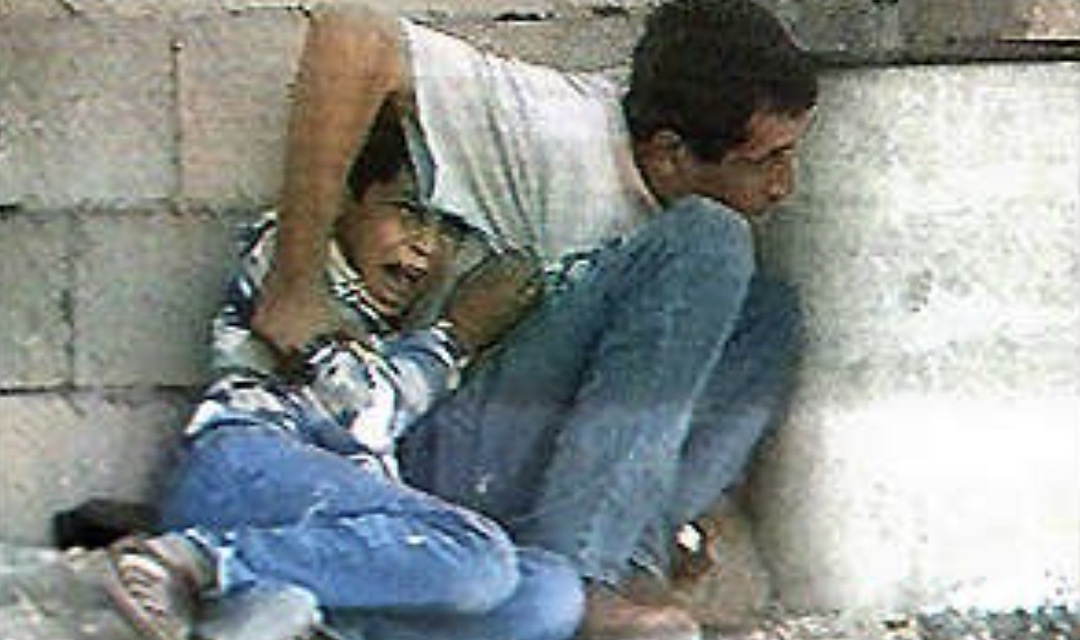Stein coins the term “repudiation script” which refers to the method of claiming the fraudulence of images and videos. These claims in the script argue that images and videos were manipulated to defame Israel in the eyes of the world.
The groundwork for the repudiation script in Israel started with the killing of Muhammad Al-Durrah on September 30, 2000, during the first few days of the second Palestinian intifada. French TV captured the 45-minute-long incident of a father protecting his son from continuous shootings resulting in the killing of the twelve-year-old. This video went viral around the world and opened up the public's eyes to Israeli state violence. Israel's response to the damning effects of the footage was the creation of a multiple-year campaign to claim that the entire event was a hoax. The campaign was led by self-styled “forensic experts” who focused on various elements of the footage such as the volume, blurred frames, and possibility of editing done by the French journalistic team. Richard Landes, an American academic and one of the leading “forensic experts” on the case, paid certain attention to the claim that the event itself was staged. Landes described the events as a scene with actors and claimed that it is no surprise as “Palestinians stage all the time”.

A frame from the footage of Muhammad Al-Durrah and his father just moments before his death (2000).
From this emerged a term that became a crucial element of the Israeli repudiation script: “Pallywood:”. Coined by Landes, the term refers to Palestinian media as a film production in which “journalists and street actors produce staged news as propaganda”. Lande’s approach to the Al-Durrah case and the creation of “Pallywood”, created a precedent for approaching all damning evidence against the Israeli state operating as a how-to-guide on creating an alibi and excusing violence.
It is very important to note that although the Israeli repudiation script strengthened during the age of the smartphone, repudiation itself has been a tactic of colonial regimes throughout history. Colonizers have always denied indigenous claims to things such as land, history, and community. Take American textbooks for example, they hardly portray the massacre of indigenous populations and attempt to paint a picture of the brave frontiersman bringing civilization to savages. These techniques have always been crucial in enabling the violence of colonialism.
“Fake news” in the media started as something only spoken about by conspiracy theorists on Reddit, but has made its way to mainstream news channels and political discourse. The 2014 fatal shooting of teenagers Nadim Nawara and Muhammad Salama in the town of Beitunia exemplifies the institutionalization of the Israeli repudiation script. The shootings took place during the annual demonstration commemorating the Palestinian Nakba, so there was an overwhelming amount of camera presence at the scene. Despite the overwhelming evidence of the killings, the Israeli public still claimed that the soldiers were only using “nonviolent” crowd control. Israeli defense Minister Moshe Ya’alon joined the dialogue by stating that although he hadn’t seen the video, the public should rest assured that it is fake because he “knows the system”. This statement is extremely alarming because it marks a shift from the need for “expert” analysis to claim evidence is fake, to the public assumption that all Palestinian footage is fake and not to be trusted. When nothing can be trusted, everything becomes discredited and video evidence– one of Palestine's most successful tools in fighting their oppression— no longer renders itself useful.
Stein concludes her paper by referencing a different kind of story. That of the IDF soldier Elor Azaria filmed executing a Palestinian resident on the balcony of his own home in 2016. This story is different because the aftermath doesn’t display the same characteristics of the repudiation script that we have seen in the other examples. It is even more disturbing. During his trial, Azaria became a celebrity within the Israeli population. He was sentenced to prison and the people demanded his exoneration. When he finished his sentence after nine months, he was welcomed home as a hero. Instead of trying to hide the evidence or claim “fake news”, he was celebrated as an executioner. Stein notes that this does not mark the end of the repudiation script, but it does make me wonder about the role that repudiation played in cultivating an environment with this degree of pride towards the murder of their enemy. Did the population ever even believe the claims or were they carefully designed for Western media to discredit Palestine?

A frame from the footage of Muhammad Al-Durrah and his father just moments before his death (2000).